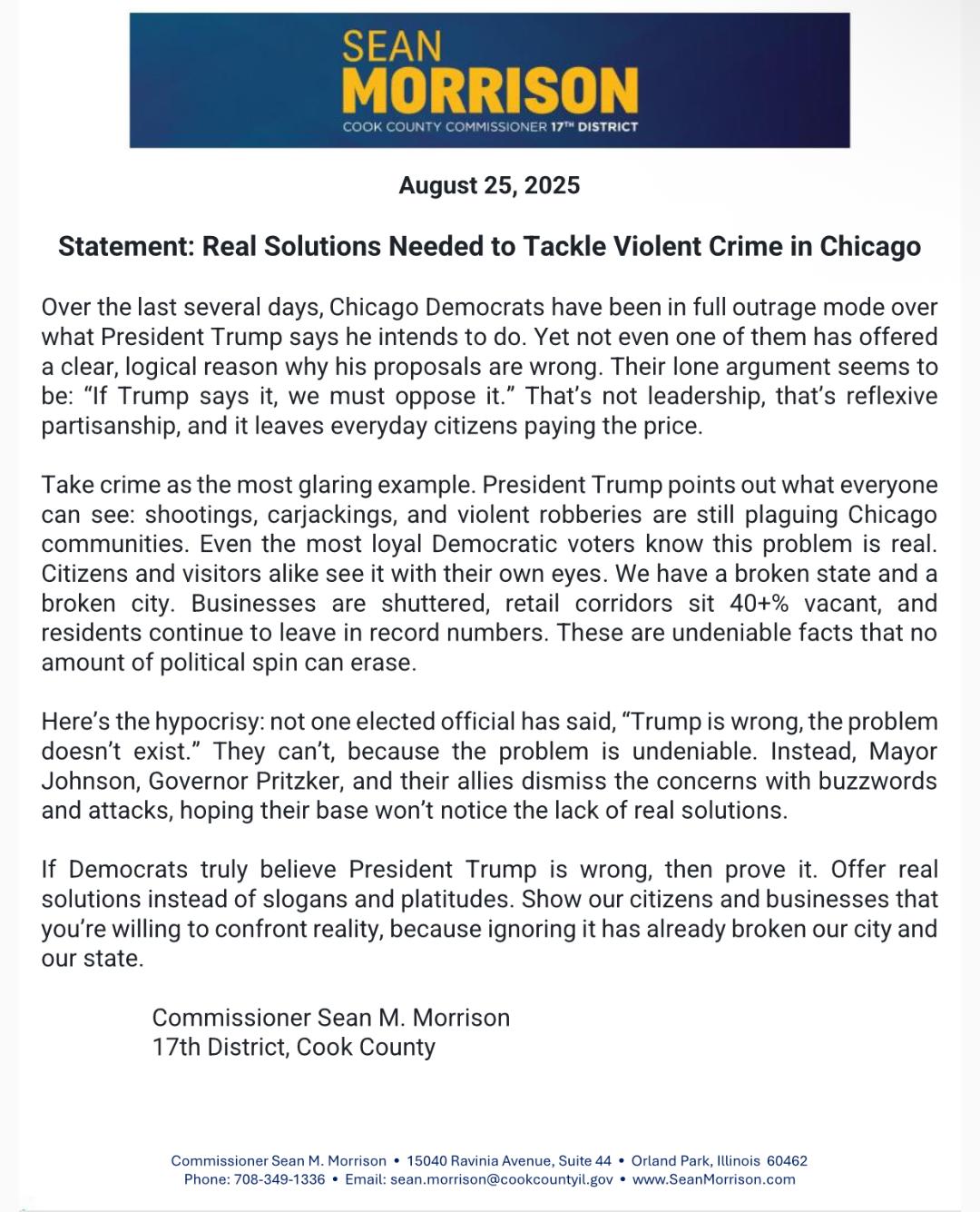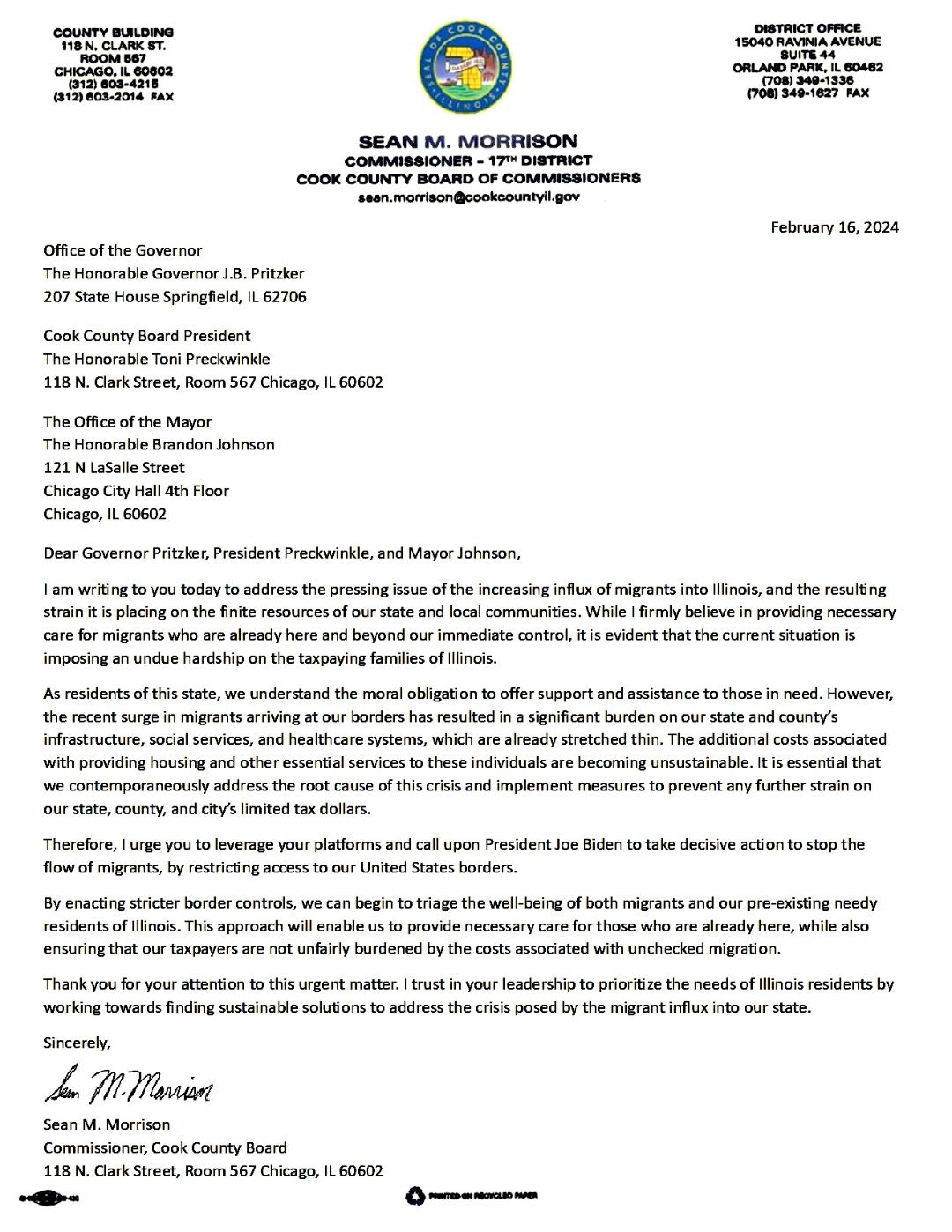STAY UP TO DATE




On April 29, Commissioner Sean Morrison joined nationally syndicated Talk Show Host Vince Coglianese on his podcast to discuss Governor JB Pritzker's inflammatory political remarks from the previous weekend. Click on the video image below and go to the 22 minute mark to watch Vince's interview with Sean.










Unsustainable Migrant Crisis Wreaking Havoc on Illinois and Local Communities - Time for Border Closure

Headlines
By Mike Nolan
A year after a state law took effect that requires first responders to carry naloxone, which can revive someone suffering from an overdose of heroin or other opioids, officers from dozens of suburban Cook County police departments have been trained in administering the drug and supplied with it.
Naloxone counteracts the life-threatening effects of an opioid overdose, which slows the heart rate and respiration, and it had already been in wide use, primarily carried by fire department paramedics, as well as police in some communities.
The state’s Heroin Crisis Act, which took effect Jan. 1 of last year, requires that all Illinois law enforcement agencies receive training and carry the drug.
An initiative spearheaded by Cook County Commissioner Sean Morrison, R-Palos Park, and Michael Schofield, chief of the Orland Fire Protection District, began training area police last spring in using a naloxone auto-injector device. The maker of the device, Kaleo Pharma, is providing, at no cost, 12,000 doses of naloxone, 800 of which have so far been distributed to suburban police departments, according to Brent Woods, administrator of the opioid overdose prevention program who works in Morrison’s Orland Park office.
Prior to the state law taking effect, some area police departments, such as New Lenox, Orland Park, Tinley Park and Will County Sheriff’s Police, had been equipping officers with naloxone. Depending on the department, some officers are using a syringe while others carry a nasal spray version of naloxone.
Fire department paramedics have long carried naloxone, but the thinking is that it’s also beneficial to put the drug in the hands of police officers who might be the first to arrive at a call for an overdose. With training administered by the Orland Fire Protection District, officers from 46 departments have so far gone through training, and those departments have been given the Evzio injectors, Woods said. Police who took part in the training sessions were expected to train other officers in their departments on using the devices.
Another eight suburban departments are awaiting training, and Morrison’s office expects other south and southwest suburban departments to apply for the program, Woods said.
“The more (officers trained and equipped with naloxone) we get out there the better,” he said.
Departments that have undergone training and been issued naloxone to officers have recorded a total of 19 “saves” of people who overdosed, including six by Lansing, two by police in Oak Forest and one each by officers in Midlothian, Palos Park, Park Forest, Posen and Steger, Woods said.
Morrison’s office began working with Virginia-based Kaleo in July 2015 to obtain the grant of Evzio injectors, he said. Each dose is in a cartridge with a retracted needle, and instead of having to read directions, the device itself “talks” the user through the process and automatically injects the patient.
Health officials and law enforcement have seen a growing number of overdose deaths due to heroin and other opioids, as well as surging numbers of deaths due to synthetic opioids such as fentanyl. The Cook County medical examiner’s office said it began routinely testing for fentanyl in June 2015 after national trends showed a spike in the opioid’s use.
The drug is 50 times more potent than heroin and 100 times more potent than morphine, according to the Centers for Disease Control and Prevention. The CDC has said that increases in deaths associated with fentanyl are attributable to illicitly-made fentanyl that is either mixed with heroin or offered to an unsuspecting buyer in the guise of being heroin.
There were 76 overdose deaths in Will County last year caused by heroin or other opioids, such as fentanyl, according to that county’s coroner, up from 53 in 2015. That number could change as additional tests are completed on some death cases. Full-year figures from Cook County’s medical examiner are not yet available, but in 2015 the county recorded 526 heroin and fentanyl deaths.
The medical examiner in early December reported that it had so far recorded 380 deaths in 2016 attributed to fentanyl or fentanyl analogs compared with 102 for all of 2015. At that time, the medical examiner also reported that it had confirmed two deaths from powerful opioids that had previously not been seen in Cook County, including one death from the fentanyl analog carfentanil, which is 10,000 times more potent than morphine and is used in veterinary practices to immobilize large animals.
“My thoughts and prayers go out to everyone impacted by Hurricane Harvey and catastrophic flooding it has caused – especially to the families and friends of those who tragically lost their lives. To the brave first responders selflessly and tirelessly fighting to keep residents safe, thank you.”
“As these events continue to unfold, my wife and I pray for the safety of each and every individual in Harvey’s path.”
Sean M. Morrison
Cook County Commissioner
17th District
“Our nation was founded on the idea that all people are created equal, regardless of creed or color. Yesterday’s rally in Charlottesville by the KKK, Nazis and white supremacists stands in stark contrast to this principle. Let me be very clear, there is no place in society for racism, bigotry or hatred of any manner, and I strongly condemn the actions taken by these individuals yesterday.”
Sean M. Morrison
Cook County Commissioner
17th District
Dear 17th District Residents:
Pace recently announced that they are in the process of converting all of their bus routes to a posted-stops-only operation. As part of this, a study was performed to identify bus stop locations along Route 379 based on safety, ridership counts and other factors. Once the conversion of Route 379 is complete, riders will only be able to board and alight the bus at posted bus stop signs listed in the chart below.
Please contact my District office at (708) 349-1336 for further information.
Sean M. Morrison
Cook County Commissioner, 17th District
Contact Us
Chicago Office
118 N. Clark Street, Suite 567
Chicago, Illinois 60602
Phone : 312-603-4215
Fax: 312-603-2014
District Office
15040 Ravinia Ave, Suite 44
Orland Park, Illinois 60462
Phone: 708-349-1336
Fax: 708-349-1627

